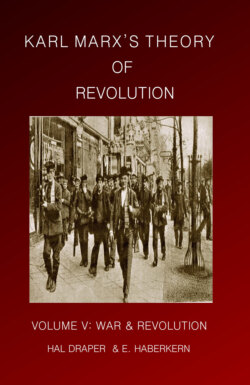Читать книгу Karl Marx’s Theory of Revolution Vol V - Hal Draper - Страница 14
На сайте Литреса книга снята с продажи.
1. War and Revolution 1793-1848
ОглавлениеThis was not the case with Marx and Engels. They began by using the words war and revolution almost interchangeably. Like most of their contemporaries, when they thought of revolution the image that preoccupied them was the revolutionary war of the French Republic in 1793-4. War and revolution were then merged. In that war—or so Marx, Engels, and most of their contemporaries, thought—the nation defended itself by mobilizing the population. And that was only possible because the people were convinced that the France they were defending was their democratic, revolutionary France; not the old France. The alliance of all the great powers against France, in turn, was provoked by the hostility of the old world to the revolution and democracy.
Modern scholarship has tended to question this oversimplified picture.1 In the beginning it was the pro-monarchists and the Gironde who formed the war party in France and those members of the Convention most sympathetic to the popular movement opposed the provocations of the French government. Robespierre was the most outspoken opponent of the war while moderates like Lafayette hoped to drown the revolutionary movement in a flood of patriotic sentiment. On this question, as on others, the politics of the French Revolution were more modern than is generally realized. Marx and Engels, however, did not know what we know now.
In any case, in 1793 the war had turned into a war between defenders of the old order and the new. What is more important for us, from 1815 on, from the signing of the treaties drawn up at the Congress of Vienna until 1848 and beyond, the diplomatic policy of the European powers aimed at subordinating dynastic conflicts and national interests to the common need to defend traditional, and not so traditional, privileges against the republican and egalitarian demons wakened by the French Revolution. They saw in every moderate liberal measure and every tentative attempt by oppressed nations to ameliorate their position the specters of Jacobinism and Napoleon. This policy, of course, made revolutionaries out of very mild reformers.
In the aftermath of Napoleon’s defeat liberalism in Germany especially was humiliated. After backing a war of liberation against the French Emperor spurred in part by promises of reform liberals were rewarded with a strengthened bureaucratic absolutism. Austria and Prussia, backed by Russia, placed the Germans under a kind of house arrest. The press was strictly censored, the Universities subjected to police control, and the radical students’ associations outlawed. All this for the sole purpose of preserving the division of the country into some thirty-odd mini-states ruled by petty princes whose cruelty was moderated only by their sloth and incompetence
Poland, however, was the lynch-pin of the whole system. This country, whose dynasty was at least as legitimate as that of the Russian Romanovs, the Austrian Hapsburgs and the Prussian Hohenzollerns, had been partitioned between the latter three for over seventy years. The Holy Alliance between Russia, Prussia and Austria was cemented by the parties’ common need to keep Poland down and, especially, to keep it from becoming a point of contention between them. That could wreck the whole system. As Engels put it “The tearing asunder of Poland by the three powers is the tie which links them together; the robbery they jointly committed forces them to support one another.”2 In 1830 and 1846 Polish insurrections, bloodily suppressed, provoked European wide outrage. They did not lead to a European war only because liberal and democratic opposition in Europe was weak or compromised.
In 1848, as in 1830, a revolution in France was simultaneously a revolt against the European-wide order policed by the Holy Alliance and backed by England. The spread of that revolution into Central and Eastern Europe had to lead to war between the revolutionary governments and the Holy Alliance. The war did not come because the revolution won out nowhere. Only in Hungary did the republican party carry out its program to the point of open rupture with the Alliance. Hungary was crushed.
In Marx and Engels’ day, then, the more consistent the revolutionary the more “prowar.” But something else, something more important, followed from the reliance on the 1793-4 analogy. The war being advocated was not a war in support of any of the existing states. It was a war against all of them by the loose coalition of opposition classes and tendencies that was called “the Democracy.”
